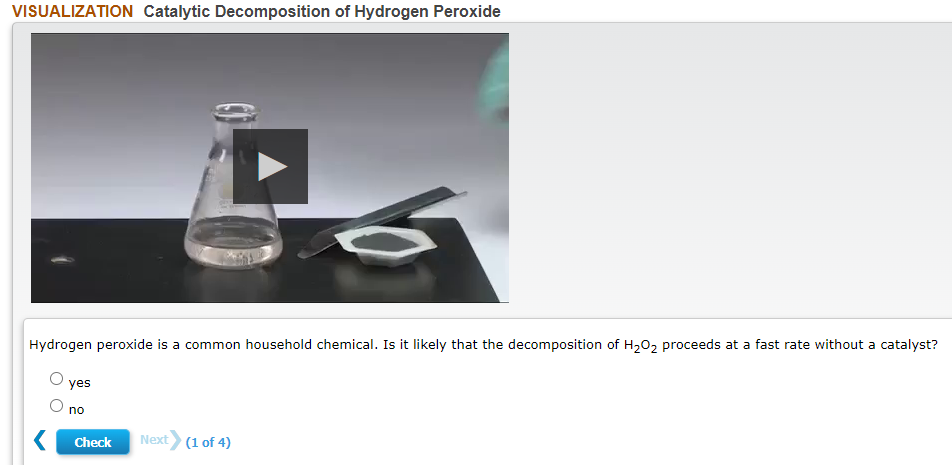Hydrogen peroxide is a common household chemical. Is it likely that the decomposition of H202 proceeds at a fast rate without a catalyst? yes no
Hydrogen peroxide is a common household chemical. Is it likely that the decomposition of H202 proceeds at a fast rate without a catalyst? yes no
Chemistry for Engineering Students
4th Edition
ISBN:9781337398909
Author:Lawrence S. Brown, Tom Holme
Publisher:Lawrence S. Brown, Tom Holme
Chapter11: Chemical Kinetics
Section: Chapter Questions
Problem 11.50PAE
Related questions
Question
6

Transcribed Image Text:VISUALIZATION Catalytic Decomposition of Hydrogen Peroxide
Often the rate of a reaction can be increased by raising the temperature or by increasing the concentrations of reactants. These methods are often not preferred because they can lead to poor reaction selectivity - meaning undesirable
side products might be formed - or the use of more reactant than necessary. Catalysts are often used to effect specific chemical changes at low temperatures and at reasonable rates. This module examines the catalytic decomposition
of hydrogen peroxide, H202. The reaction being examined is:
2 H202(aq) – 2 H20(t) + 02(9)
Next (Introduction)

Transcribed Image Text:VISUALIZATION Catalytic Decomposition of Hydrogen Peroxide
Hydrogen peroxide is a common household chemical. Is it likely that the decomposition of H202 proceeds at a fast rate without a catalyst?
yes
no
Check
Next (1 of 4)
Expert Solution
This question has been solved!
Explore an expertly crafted, step-by-step solution for a thorough understanding of key concepts.
Step by step
Solved in 2 steps

Knowledge Booster
Learn more about
Need a deep-dive on the concept behind this application? Look no further. Learn more about this topic, chemistry and related others by exploring similar questions and additional content below.Recommended textbooks for you

Chemistry for Engineering Students
Chemistry
ISBN:
9781337398909
Author:
Lawrence S. Brown, Tom Holme
Publisher:
Cengage Learning

Chemistry: Principles and Practice
Chemistry
ISBN:
9780534420123
Author:
Daniel L. Reger, Scott R. Goode, David W. Ball, Edward Mercer
Publisher:
Cengage Learning

Chemistry: The Molecular Science
Chemistry
ISBN:
9781285199047
Author:
John W. Moore, Conrad L. Stanitski
Publisher:
Cengage Learning

Chemistry for Engineering Students
Chemistry
ISBN:
9781337398909
Author:
Lawrence S. Brown, Tom Holme
Publisher:
Cengage Learning

Chemistry: Principles and Practice
Chemistry
ISBN:
9780534420123
Author:
Daniel L. Reger, Scott R. Goode, David W. Ball, Edward Mercer
Publisher:
Cengage Learning

Chemistry: The Molecular Science
Chemistry
ISBN:
9781285199047
Author:
John W. Moore, Conrad L. Stanitski
Publisher:
Cengage Learning

Chemistry: An Atoms First Approach
Chemistry
ISBN:
9781305079243
Author:
Steven S. Zumdahl, Susan A. Zumdahl
Publisher:
Cengage Learning

Chemistry & Chemical Reactivity
Chemistry
ISBN:
9781133949640
Author:
John C. Kotz, Paul M. Treichel, John Townsend, David Treichel
Publisher:
Cengage Learning

Chemistry & Chemical Reactivity
Chemistry
ISBN:
9781337399074
Author:
John C. Kotz, Paul M. Treichel, John Townsend, David Treichel
Publisher:
Cengage Learning